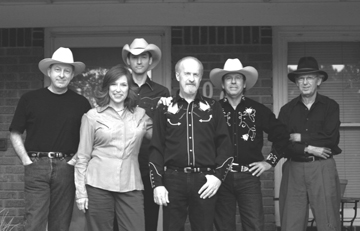 With wife Susan and some old pals, singer-songwriter Jim Colegrove (center) mines Lost Country with contemporary style.
With wife Susan and some old pals, singer-songwriter Jim Colegrove (center) mines Lost Country with contemporary style.
|
|
A D V E R T I S E M E N T
|
|
|
|
A D V E R T I S E M E N T
|
|
The Thrill Ain’t Gone
Even though ex-hippie muso Jim Colegrove’s past is long behind him, he and his Lost Country have a bright future.
By TOM GEDDIE
It might be impossible for anyone under the age of, say, 30 to look at white-haired, straight-backed Jim Colegrove and see him as a drunk, stoned hippie musician trippin’ through the Age of Aquarius.
Well, for a few weeks in 1970, that’s exactly what Colegrove was. Along with Janis Joplin, The Grateful Dead, The Band, and a bunch of other legends in rock, blues, folk, and country, Colegrove made the five-show, 3,000-mile train ride from the States into Canada, captured on the 2003 documentary Festival Express.
Colegrove was there as bass player for Ian and Sylvia Tyson’s band, Great Speckled Bird, and the long-time Fort Worthian remembers the tour as “pretty much like the documentary” — lots of drugs and alcohol. He talks easily and fondly about the past, although his head is firmly in the present. Lost Country, Colegrove’s group with wife Susan and some old friends, has just released its fourth full-length, Long Gone Thrill. At one point on the disc, Colegrove says he’s “too old to die young.”
After a heart attack in 1998 sidelined him for a while, Colegrove returned to music a couple of years ago with renewed vigor. Now 64, he says he wants to “do it all” before he dies. “I just wanted to do it one more time before I hung it up,” he said. “I felt like I still had some good years in me and that I’m performing now better than I ever have. Maybe I’m not singing any better, but I’m playing better than I ever did.
“This is probably going to be my last time,” he continued. “Starting a band and trying to get that band working and keep it going is very difficult. I certainly want to do this for another three years at least so I can say I played in bands for 50 years.”
Ohioan Colegrove relocated from Woodstock, N.Y., to Fort Worth in 1974 at the request of local legend Stephen Bruton. “Stephen was on the road a lot with Kris Kristofferson at that time, and we had a lot in common musically,” Colegrove said. “When I decided to leave the East Coast and head West, he talked me into coming to Fort Worth.”
Colegrove’s first music stop in town was the Phase 2 club, where he saw bluesman extraordinaire Robert Ealey and his Five Careless Lovers. Colegrove says the place was “the tiniest little joint in the world, filled with spray-painted pictures on the walls.” Ealey and Colegrove hit it off, and before long, Colegrove and Bruton founded the Juke Jumpers, the group that held down the regular Monday night spot at Ealey’s old haunt, The Bluebird, before quickly becoming his backing band. Which is all pretty historical stuff, but as Colegrove recalls, “Sometimes nobody would be there but some men playing dominoes and watching Monday Night Football.”
The diverse music scene kept Colegrove from wandering away. “With its roots in Western swing, blues, and R&B, Fort Worth is unique,” he said. “The average Fort Worth musician is at home with either country or blues; it’s historically been a great place to learn.”
Even the name — and some of the music his band plays — reflects Fort Worth’s musical diversity and Colegrove’s early influences. “We all like a variety of music and didn’t really want to have to say this or that is what we are, because once you start going a direction then you’ve been typecast,” he said. “Yes, there’s a danger of putting ‘country’ in the name, but we’ve got a steel guitar player so we have to be country, right?”
Words are as important as the music to Colegrove, who in the mid-1980s performed and recorded with legendary Beat poet Allen Ginsburg. A book of Colegrove’s poetry, Vacation Dreams, was published in 1983 by Aldine Publishing.
“Writing poetry gives you a little bit more freedom to expand,” he said. “You don’t have to stick with a particular structured form or meter that’s going to fit a song.”
That poetic touch shows up in a couple of Long Gone Thrill tracks, most notably on “The Night Café,” a tune based on Van Gogh’s painting of the same name.
Colegrove says that his goal with Lost Country is to be relevant.
“It’s not like I’m seeking stardom, because I’m really not,” he said. “Long Gone Thrill brings styles I’m interested in onto the same table. It kinda proves to me at least that I can still do it. If people hear it, if they have access to it, they’ll agree.”
 Email this Article...
Email this Article...

